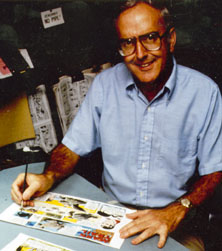
Lavrentiy Pavlovich Beria was a Georgian Bolshevik and Soviet politician, Marshal of the Soviet Union and state security administrator, chief of the Soviet security, and chief of the People's Commissariat for Internal Affairs (NKVD) under Joseph Stalin during the Second World War, and promoted to deputy premier under Stalin in 1941. He officially joined the Politburo in 1946.

Mikhail Afanasyevich Bulgakov was a Russian, later Soviet writer, medical doctor, and playwright active in the first half of the 20th century. He is best known for his novel The Master and Margarita, published posthumously, which has been called one of the masterpieces of the 20th century.

A graphic novel is a long-form, fictional work of sequential art. The term graphic novel is often applied broadly, including fiction, non-fiction, and anthologized work, though this practice is highly contested by comics scholars and industry professionals. It is, at least in the United States, typically distinct from the term comic book, which is generally used for comics periodicals and trade paperbacks.
Grigori Rasputin (1869–1916) was a Siberian peasant and mystic, who became a healer and adviser for the Romanovs at the end of the Russian Empire.

A cartoonist is a visual artist who specializes in both drawing and writing cartoons or comics. Cartoonists differ from comics writers or comic book illustrators in that they produce both the literary and graphic components of the work as part of their practice. Cartoonists may work in a variety of formats, including booklets, comic strips, comic books, editorial cartoons, graphic novels, manuals, gag cartoons, storyboards, posters, shirts, books, advertisements, greeting cards, magazines, newspapers, webcomics, and video game packaging.
Death and the Maiden, a concept ultimately derived from the Medieval "Dance of Death", may refer to:
The "doctors' plot" affair was an alleged conspiracy of prominent Soviet medical specialists to murder leading government and party officials. It was also known as the case of saboteur doctors or killer doctors. In 1951–1953, a group of predominantly Jewish doctors from Moscow were accused of a conspiracy to assassinate Soviet leaders. This was later accompanied by publications of antisemitic character in the media, which talked about the threats of Zionism and condemned people with Jewish surnames. Following this, many doctors, both Jews and non-Jews, were dismissed from their jobs, arrested, and tortured to produce admissions. A few weeks after the death of Stalin in 1953, the new Soviet leadership said there was a lack of evidence regarding the doctors' plot and the case was dropped. Soon after, the case was declared to have been a fabrication.
In comics in the United States, a trade paperback is a collection of stories originally published in comic books, reprinted in book format, usually presenting either a complete miniseries, a story arc from a single title, or a series of stories with an arc or common theme.
The Killing Joke may refer to:
Neo-Stalinism is the promotion of positive views of Joseph Stalin's role in history, the partial re-establishing of Stalin's policies on certain issues and nostalgia for the Stalin period. Neo-Stalinism overlaps significantly with neo-Sovietism and Soviet nostalgia. Various definitions of the term have been given over the years.
The Black Dahlia is a nickname given to 1940s murder victim Elizabeth Short.
Heroic realism is art used as propaganda. Examples include the Socialist realism style associated with Socialist states, and sometimes the similar art style associated with Fascism. Its characteristics are realism and the depiction of figures as ideal types or symbols, often with explicit rejection of modernism in art.

Cancer Ward is a semi-autobiographical novel by Nobel Prize-winning Russian author Aleksandr Solzhenitsyn. Completed in 1966, the novel was distributed in Russia that year in samizdat, and banned there the following year. In 1968, several European publishers published it in Russian, and in April 1968, excerpts in English appeared in the Times Literary Supplement in the UK without Solzhenitsyn's permission. An unauthorized English translation was published that year, first by The Bodley Head in the UK, then by Dial Press in the US.
A ghosthunter is a person who engages in ghost hunting, the process of investigating locations that are allegedly haunted.

Yen Press, LLC is an American manga, graphic novel and light novel publisher co-owned by Kadokawa Corporation and Hachette Book Group. It published Yen Plus, a monthly comic anthology, between 2008 and 2013. In addition to translated material, Yen Press has published original series, most notably a manga adaptation of James Patterson's Maximum Ride and Svetlana Chmakova's Nightschool.

Richard Appignanesi is a Canadian writer and editor. He was the originating editor of the internationally successful illustrated For Beginners book series, as well as the author of several of the series' texts. He is a founding publisher and editor of Icon Books. He was founding editor of the Manga Shakespeare series. He is a former executive editor of the journal Third Text, and reviews editor of the policy studies journal Futures.

The Death of Stalin is a 2017 political satire black comedy film written and directed by Armando Iannucci and co-written by David Schneider and Ian Martin with Peter Fellows. Based on the French graphic novel La Mort de Staline (2010–2012), the film depicts the internal social and political power struggle among the members of Council of Ministers following the death of Soviet leader Joseph Stalin in 1953. The French-British-Belgian co-production stars an ensemble cast that includes Steve Buscemi, Simon Russell Beale, Paddy Considine, Rupert Friend, Jason Isaacs, Olga Kurylenko, Michael Palin, Andrea Riseborough, Dermot Crowley, Paul Chahidi, Adrian McLoughlin, Paul Whitehouse, and Jeffrey Tambor.







